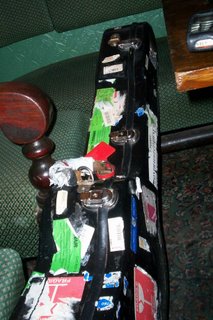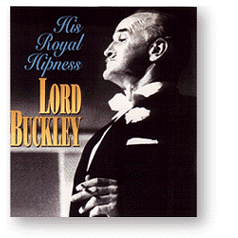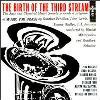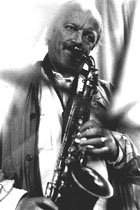
There had been a buzz all week round the watering holes – Pete Morton – Friday – be there... come early... Pete is back in town...
Pete Morton is a constant...even though I haven't heard him live so much recently and was removed by geography and the madness of relationships from the game for a long time before that. But back in the East Midlands – who ya' gonna call? This is the guy who reduces me to tears, makes me laugh out loud and causes me to click my heels with the sheer éclat of his muse: they say he's a best kept secret and maybe that is (unfortunately) true... but not on his home ground...
And: why write about those who do not move the blood... Pete always has.
I got to the
Pack before 8 pm and the place was quiet – there was that odd feeling that – maybe it was going to be one of those dire nights when no-one turns up – then the room started to fill rapidly. No problem. Everyone expectant – and a cross section of ages for once, not just the usual ageing folk club diehards. An introductory song from Frank Marmion, the club curator and main resident musician – in his own inimitably waggish style: 'The hole in the elephant's bottom.' Inspired: old school music hall, really, as being totally different to the main emotional tenor of the night, raising much laughter and easing the audience in smoothly. Then: coming up fast – Pete Morton.
Who has been playing this old club on and off for many years, since his early breakout onto the scene with a refreshingly dynamic take that rode on the punk energy of the times (and the energy of his earlier musical attempts at rock and roll anarchy and riot, amusingly mentioned later in the evening). He looked a little tired, just back from the States a week before and constant gigging since apparently. But with an audience like this, the emotional energy is palpable – just reach out and touch and be enervated. So he did.
Starting off with a song from his new album, 'Great Gold Sun.' A ¾ evocation of another time which could have lapsed into the sentimentality that is rampant on the folk scene – all those bygone songs of yearning yesteryears. Pete avoids this – on one level, by his delivery, a very good singer who can soar upwards and come through with an emotional honesty that hits hard. Also by the cunning and craft of the song: using the distancing device of a flickering, crackly old silent piece of film that shows a town scene from 1905, he wonders where the people went to, notices social details such as 'everyone's wearing a hat.' The film acts to stand in between us and them, a barrier which recognises the distance that the sentimental ones ignore and that can only give snatched glimpses of the past. Almost a straight observation of the landscape and people, there is a sadness behind in the awareness that this is time gone – only scratchily available now through a battered old scrap of film. Yet the casual observations of individual quirks somehow build a subtle if flimsy bridge across time- we are connected to our forefathers and mothers across death, if only for a song's duration.
Following this: an interesting - and brave – take on the Palestine/Israeli conflict. Admonishing the opposing participants as if they were squabbling children – brothers especially who fight more savagely in sibling rivalry than strangers in random encounters. This is not the usual weary knee-jerk reaction but a song that tries to be even-minded – I guess it would probably offend both sides which makes it relevant. 'Overtired.' But who is speaking? This could be seen as Western patronising on one level – except that the narration can come from – everyone. Anyone. And the distance again that this creates seems to put the conflict into a wider historical timeframe, outside the daily catalogue of horrors and name-calling - with the promise that resolution sooner or later is inevitable. Someday... At the end of the song there were sirens outside moving fast across town in the East Midlands night. An almost chilling piece of synchronicity.
Moving on. 'The Busker's Song. An evocation of teenage rebellion – 'we played Ramones songs faster than the Ramones' - and the eventual inevitable separation from other like-minded anarcho-rebels as the mirror person in the song is met years later and turns out to have become a straight member of society – as opposed to the singer/musician who took the rhetoric (too?) seriously and followed his dream: a rake and a rambling boy in the ongoing vie bohème. It's a song about being a musician and growing older and looking back – noting and measuring the degrees of separation from those who went into jobs and raised families etc. Especially resonant to musicians who have followed the same roads... But it is not cheesy – even-handed while celebrating the loneliness, it does not snipe at the one who stayed home. Which is an ongoing quality of Pete's music – a generosity that can applaud difference. A generosity of words as well – as they tumble out and across the bar-lines in a splendid torrent.
'The Luckiest Man' is a celebration of family – Mum and Dad. Social history and celebration of place – Leicester – which comes over all the more piquantly because Pete does not adopt a foreign accent for his songs or flatten his inherited inflections out of recognition but sings well within the gradations of the local, so that a fragment of dialect does not jar. This gives his music an ease to itself, a space to breathe easily.
A song for himself... a personal request: 'Further.' A song that moves from the local to the universal and back which is as good a phrase as any to describe Pete's main songwriting tactic. In this case, a ramble through Lincolnshire, during which he reflects that his language is related to Friesian – the Holland across the sea from the fen country. And how much he loves this land. With the line that sums up a main strand of his thought and music: 'The world is crazy but your love can change it./ And it's going to get better 'cause we carry it on.' Ending on the universal inside the local – sitting in a cafe in Lincoln but looking out at the world: 'I raised my glass for all mankind.'
He puts this technique to good use again in the song: 'Post Office Queue.' Celebrating the myriad lives that can be found in something as mundane as – a queue at the Post Office. An up song, quirkily amusing. And an interesting device – the queue - to engage lightly with the modern world and contrast the human speech of people thrown into accidental interaction with the mechanical voice that directs people to the different counters as they become available. 'Cashier number four, please'...
Pete has never stayed still on his musical quests – delivering his next song in passable Dutch from the Hollander songwriter Stef Bos. (
Here - or
here...). This looks a promising direction – for his Dutch gigs! Not sure how much you can get away with in monolingual England. Only joking - the choruses are not that difficult to get around.
Followed by the end set number: 'Harvest.' A loaded word. Initially, images of rural England in a folk song context, certainly. But something more going on here – 'Love' is bringing the harvest home and operating on metaphorical level. The song depends to a certain extent on lists of opposites throughout: 'The passions come the passions go,' 'The pleasures and the troubles,' 'Joy and sorrow sun and rain,' 'The body grows the body wanes' Etc. These dialectic encounters set up the very rhythm of life, it seems – and are resolved when the higher force intervenes: 'Love.' All you need? A cheap shot – there is a denseness to this song which resists easy analysis.
As intimated in his introductory song to the evening, a new career awaits Frank Marmion if there is a musical hall revival: he opens the second half with 'After the Ball.' A song that reveals some strange sadness underneath the familiarity of the chorus. In a voice, as someone famously said: 'throbbing with emotion and alcohol,' two traditions meet – or recombine as the music hall was where much 'folk music' that survived the rise of urban England flowed into the new, more consciously commercial mainstream, I guess, after the industrial revolution. Chris Coleman essayed a nifty piece of ragtime guitar playing as contrast. John Bentham, local stalwart of the traditional scene sang unaccompanied and as ever - well. Sheila Mosley next – another local singer with an unusual high and sweet voice. (Her daugher runs
this site about Pete Morton, by the way... worth a look... ) These floor singers are varied and skilful – a tribute to the Pack Horse and also the seemingly higher standard of musicianship around these days. Not one of those dreadful tributes to laziness – a songsheet – in site. They frame Pete's performance well.
Second half: going into the John Clare song I mentioned above – 'The Shepherd's Calendar.' I love this song, so evocative of the poet's tortured, tragic yet defiantly optimistic life – 'The bells of life are ringing...And anyway the birds are sweetly singing.' Contrasting the world of rural Northamptonshire/Nature with the bustle and harshness of London – the old and the new England - and the brief fame he encountered there before his eventual return and later descent into madness. A snapshot of a moment when he was caught between two worlds on the way to meet his publisher: ' I step from my world toward his/I'm like a beggar on a bridge/Between two understandings.' The guitar figure is that familiar descending pattern in G he uses (maybe too often!) that evokes the gait of someone strolling out to London and their problematic destiny. 'London is calling with its scheme... I do not know where the wolves lie'... All provincials who travelled that road know that big city wolf howl – and the harbinger, poor old mad John Clare from Northampton – sucked blindly into the Metropolitan dazzle so long ago... plus ça change etc...
Moving to an American poet: 'I'm in love with Emily Dickinson.' Staying inside with a ghost - 'Some say she died years ago' - evoked by the immortality of her achievement and her presence: 'I heard her down the hall.' A celebration of what reading poetry is probably all about – entering a zone beyond the temporal – as the narrator echoes the strange interiorised life of Dickinson at her family home in Amherst: 'That's why I stay indoors/and let the world go proudly by.' Describing the relationship one has with a loved writer – intense and almost erotic and transcending time. The weird cyberspace of literature...
From the literary to – 'The Battle of Trafalgar.' The pub in Leicester where he wrote it during a drinking session, not the famous conflict of 1805. A raucous paean to the eccentricities and foibles of the common run – 'they'll never clone people like this in a million years.' The surreal in the ordinary. Anyone who has ever participated in one of those lock-ins that defiantly go outside of time – in both senses – temporal and legal (before the new laws anyway) -creating a temporary zone of freedom where strangers meet and enjoy the ongoing barminess- will know what he is describing. If you've never been there – you won't truly appreciate this song...
'Corruption country.' Displays the manner in which Pete can be strongly moral in his social criticism – but still up-beat enough to point beyond the darkness. Some powerful imagery here –
'Corruption Country it knows no bounds
It's a killer it's a thief it's a bloodthirsty pack of hounds.'
Describing the all-inclusive manner of contemporary society – 'it knows no bounds.' The older corruptions were more ring-fenced in a way, more contained, compared to the pervasive intrusions of today that spill over everywhere – on a scale never seen before due to the power of technology but backed up when necessary by the traditional thuggeries – 'killer,' 'thief,' 'pack of hounds.' Images that link criminal violence with the vengeance of the law on a common participatory ground of evil. This viral character of contemporary corruption and darkness is further taken on: 'runs amok through the fields of the good and it craves more wealth.' A wild apocalyptic floodtide, out of control... yet counterbalanced by the continual growth of democracy which 'is still a child/but it's growing every day.' To the extent that 'One day soon... Corruption Country will be gone.' An optimistic take, maybe. But heartwarmingly so: we can sometimes stare too long into the headlights of brutal events as they come at us and be hypnotised into complacency and cowardice. An interesting song that is not geographically specific – it could apply to almost any country on some level. With a strong hint- maybe - of the growing pains of young democracy in Iraq and Afghanistan? The ambiguity and universality again makes the song resonate more strongly...
'The Shores of Italy' is an absolute killer and heartbreaker. About an incident off the coast of Italy concerning a boat full of African immigrants sinking. No moralising, or explicit side taking. No slogan banging. Just a compassionate and tragic story – about the dazzling mirage of wealthy Europe and freedom from want for the dispossed of Africa (and by extension, beyond...). About the disorientation of transit between home and and a fearful, uncertain future: 'When I lose my compass and I'm thinking of Africa.' A stunning rendition and raising of the grim images lurking beyond the surety and safety all too easily taken for granted: 'So many dreams lost on an unknown sea.' A song that haunts you for days afterwards...
Another Dutch song. Dutch always sounds slightly familiar yet off-kilter – a weird funhouse mirror image of English. I am not unfamilar with Dutch music so I enjoy these Lowlands journeys – and the audience seem happy enough as they struggle to sing along... a contrast to Holland where most people could probably make every chorus tonight in English without too much linguistic strain...
A traditional song at last: 'Farmer's Boy.' A song Pete has made his own, which suits that open-throated soaring voice. And an interesting story buried inside the happy ending and narrative trajectory lit by bucolic sunlight – the lad who comes to the farm looking for work has a lot of hungry mouths to feed which hints at the harsher life of the rural poor back when. One of those rolling choruses suited to a venue like this. I looked at the faces of the audience as they joined in: ecstasy.
Going out on...
'Six Billion Eccentrics.' A light-hearted crowd-leaver. But again – that celebration of the extraordinary in the supposed mundane – we are all wonderfully different and this should be celebrated, the title referring, of course, to the massed population of the world.
The encore. Riding out on 'Another Train,' what else? About the reality of redemptionary second chances in life stated bluntly: 'There always is.'. I've heard others sing it and it travels well but... always better from the fountainhead and weirdly, still fresh... A strong song that means a lot to many people...
Summation: Pete said earlier down in the bar that most reviews read like train time-tables - lists of the songs and little else. I've tried to get away from that by using my transcribed reactions to the music as I heard it as much as possible – a barrelfull of emotion, for sure, but - not exactly recollected in tranquility - as I did not have my glasses with me that night so the notes were even more scrawled and indecipherable than usual – more: feverishly embellished. A distancing technique of my own but hopefully retaining some immediacy... The next day I was sat in a Loughborough bar with Frank Marmion and he said something interesting: that he was still full emotionally from the night before. I knew what he meant – there is a lot to unravel and take in when Pete Morton performs. But the first and lasting impression is the emotional force he sends out to his audience. By being true to himself – still the Leicestershire pronunciations scattered throughout the songs, the voice clear and true, lightly rooted in its place but flexible enough to encompass the greater world without compromising its origins - he creates a unique body of work. English yet universal, looking for the common humanity of all far and wide while simultaneously rejoicing in the individuality of each person. Beyond system or ideology, a spiritual take on life that needs no priests or churches, rooted perhaps in the rebellious culture of the English antinomian heritage from the Ranters and beyond through the anonymous rebel past and back via a couple of individuals he has written songs about - George Fox, John Clare - by way of the Spinster of Amherst. Who, come to think of it, took the Puritan heritage of the Bay Colonies, refracted it through the ballad and hymn forms of her culture and produced amazing anticipations of the modern and post-modern muse with her fragmented lines, dashes, taut compressions and wild wired conversations and arguments with God.
Dickinson was a questor through internal, enigmatic spaces...
'EXULTATION is the going
Of an inland soul to sea,
Past the houses, past the headlands,
Into deep eternity! '
The female internalised counter-part(and subtle counterpuncher) to
Walt Whitman's outdoor, brawling, sprawling poems that followed and delineated the outer space of the growing country. Maybe Pete should write a song about him... as a man who celebrated democracy and the individual as paradigm for all, with a matchless joyful optimism for the possiblities of life, he seems a fitting anticipatory member of this radical heritage:
'I CELEBRATE myself;
And what I assume you shall assume;
For every atom belonging to me, as good belongs to you.'
Pete Morton. One day in Loughborough - we raised our glasses to him...










